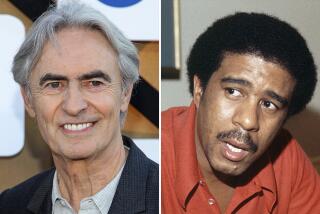‘Letters’ Offers Insight on Need to Vent and Be Heard
- Share via
In the days of instant e-mail and Internet relationships, there’s something old-fashioned about citizens communicating with other citizens through the smudgy, actual medium of newsprint. A new collection, “Letters to the Editor,” out this week from Touchstone, a division of Simon & Schuster, offers a unique mini-history of small-town life over two centuries. Members from the Bloomsburg Theatre Ensemble, who edited the book, are here until Sunday, acting out a selection of missives on the wide range of topics that move people to write letters to the editor, from the outrageously petty to the touching and profound.
The letters are all from the newspapers of Bloomsburg, Pa., and surrounding counties. Bloomsburg is a town of 12,000 in the western foothills of the Appalachian Mountains that has farms and a university and was once home to a thriving industry, the Magee Carpet Co., which shut down in the 1970s. It is as good a symbol for the non-urban American experience as Thornton Wilder’s Grover’s Corners. The show, also called “Letters to the Editor,” is well set off outdoors at downtown’s Watercourt, where the stage is ringed in the back by a pond with floating islands of shrubs.
The human need to be heard and to set the record straight is here, in all of its absurdity and importance. In 1983, one Bloomsburg resident reported the results of his timing the traffic light at Route 487 and Central Road. Most disturbing to him, he found the light did not change at regular intervals. In 1813, a husband announced to the community that he would not pay his wife’s debts, as she “eloped from my bed and board” with no provocation whatever. Twenty-one days later, the wife wrote in to say that she left because her husband almost cut her throat with a razor.
Peter Brown, Tom Byrn, Jim Goode and Sharon Pabst each play writers of both sexes, all ages and many dispositions (Mary Knysh offers strolling guitar accompaniment). Much of the “social debate” that goes on in the pages of various dailies and weeklies in the Bloomsburg area are specious and comic--such as the man, writing in 1989, who was upset by discussions of the legality of flag-burning and soberly offers the suggestion flags be made from nonflammable material. But one can’t help noticing how ordinary writers rise to eloquence when discussing issues of more central importance to the human condition, such as war and racism.
“Letters to the Editor” moves around in time, grouping the letters more by subject or context. A montage of war letters, encompassing issues about conscription and hardship, crosscuts from soldiers writing during World War II, to the Civil War, to World War I, to the Spanish American War, to Vietnam, to Desert Storm, to the Indian Wars to Korea. The formality of the language may vary, but the same distress is apparent in all of the excerpts.
*
In 1992, one newspaper, the Press Enterprise, instituted a new forum for mouthing off, a 30-second phone message line. Calling in, readers could remain anonymous but were not allowed any personal attacks or political endorsements. Hilariously acted out by the ensemble, these transcripts prove that people who call in are funnier, more outrageous, less self-conscious and, if possible, even more consumed with trivia than those who put pen to paper.
In 1971, the Morning Press printed a debate between an “out-of-towner” upset about the “peddlers” clogging up traffic on North Market Street and several citizens who treasure the farmers who sell fresh fruit and vegetables on that thoroughfare. The actors convey the importance of this debate--even though it covers just a tiny acreage of the Earth, it still concerns the world we create. “Letters to the Editor” makes clear that, from a distance, our petty quarrels define us, no matter how ridiculous or ephemeral they may seem on the day they were first written.
*
* “Letters to the Editor,” California Plaza Watercourt, 350 S. Grand Ave., tonight-Sunday, 8 p.m. American Sign Language interpreter; post-play discussion, Friday only. Ends Sunday. Free. (213) 687-2159. Running time: 2 hours, 20 minutes.
More to Read
The biggest entertainment stories
Get our big stories about Hollywood, film, television, music, arts, culture and more right in your inbox as soon as they publish.
You may occasionally receive promotional content from the Los Angeles Times.










